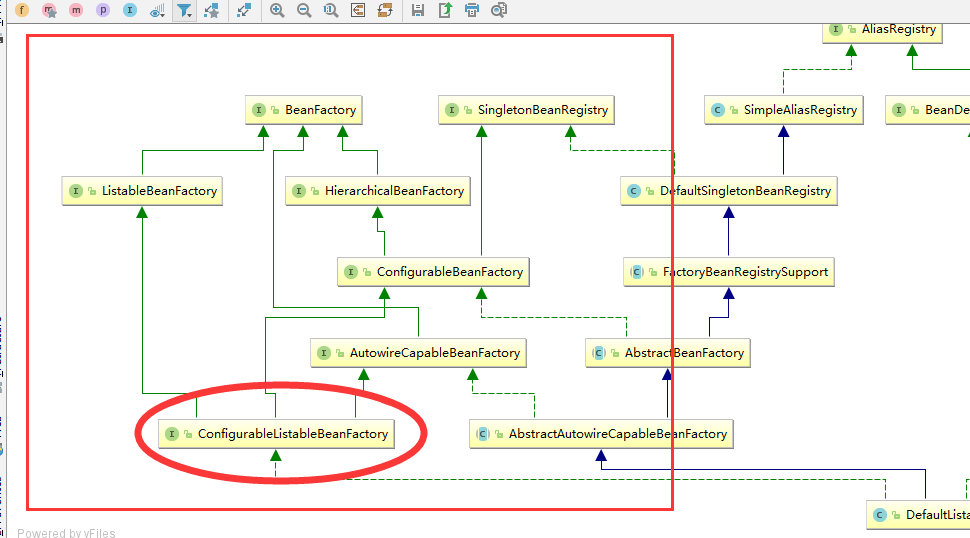
用机器翻译+原作者的翻译:https://blog.csdn.net/u011179993/article/details/51636742
/* * Copyright 2002-2015 the original author or authors. * * Licensed under the Apache License, Version 2.0 (the "License"); * you may not use this file except in compliance with the License. * You may obtain a copy of the License at * * http://www.apache.org/licenses/LICENSE-2.0 * * Unless required by applicable law or agreed to in writing, software * distributed under the License is distributed on an "AS IS" BASIS, * WITHOUT WARRANTIES OR CONDITIONS OF ANY KIND, either express or implied. * See the License for the specific language governing permissions and * limitations under the License. */ package org.springframework.beans.factory.config; import java.util.Iterator; import org.springframework.beans.BeansException; import org.springframework.beans.factory.ListableBeanFactory; import org.springframework.beans.factory.NoSuchBeanDefinitionException; /** * Configuration interface to be implemented by most listable bean factories.
* In addition to {@link ConfigurableBeanFactory}, it provides facilities to * analyze and modify bean definitions, and to pre-instantiate singletons. * * <p>This subinterface of {@link org.springframework.beans.factory.BeanFactory} * is not meant to be used in normal application code: Stick to * {@link org.springframework.beans.factory.BeanFactory} or * {@link org.springframework.beans.factory.ListableBeanFactory} for typical * use cases. This interface is just meant to allow for framework-internal * plug'n'play even when needing access to bean factory configuration methods. * * @author Juergen Hoeller * @since 03.11.2003 * @see org.springframework.context.support.AbstractApplicationContext#getBeanFactory() */ public interface ConfigurableListableBeanFactory extends ListableBeanFactory, AutowireCapableBeanFactory, ConfigurableBeanFactory { /** * Ignore the given dependency type for autowiring: * for example, String. Default is none. * @param type the dependency type to ignore
设置忽略的依赖类型关系,注册找到特殊的依赖 */ void ignoreDependencyType(Class<?> type); /** * Ignore the given dependency interface for autowiring. * <p>This will typically be used by application contexts to register * dependencies that are resolved in other ways, like BeanFactory through * BeanFactoryAware or ApplicationContext through ApplicationContextAware. * <p>By default, only the BeanFactoryAware interface is ignored. * For further types to ignore, invoke this method for each type. * @param ifc the dependency interface to ignore * @see org.springframework.beans.factory.BeanFactoryAware * @see org.springframework.context.ApplicationContextAware
设置忽略依赖接口关系 */ void ignoreDependencyInterface(Class<?> ifc); /** * Register a special dependency type with corresponding autowired value. * <p>This is intended for factory/context references that are supposed * to be autowirable but are not defined as beans in the factory: * e.g. a dependency of type ApplicationContext resolved to the * ApplicationContext instance that the bean is living in. * <p>Note: There are no such default types registered in a plain BeanFactory, * not even for the BeanFactory interface itself. * @param dependencyType the dependency type to register. This will typically * be a base interface such as BeanFactory, with extensions of it resolved * as well if declared as an autowiring dependency (e.g. ListableBeanFactory), * as long as the given value actually implements the extended interface. * @param autowiredValue the corresponding autowired value. This may also be an * implementation of the {@link org.springframework.beans.factory.ObjectFactory} * interface, which allows for lazy resolution of the actual target value. */ void registerResolvableDependency(Class<?> dependencyType, Object autowiredValue); /** * Determine whether the specified bean qualifies as an autowire candidate, * to be injected into other beans which declare a dependency of matching type. * <p>This method checks ancestor factories as well. * @param beanName the name of the bean to check * @param descriptor the descriptor of the dependency to resolve * @return whether the bean should be considered as autowire candidate * @throws NoSuchBeanDefinitionException if there is no bean with the given name */ boolean isAutowireCandidate(String beanName, DependencyDescriptor descriptor) throws NoSuchBeanDefinitionException; /** * Return the registered BeanDefinition for the specified bean, allowing access * to its property values and constructor argument value (which can be * modified during bean factory post-processing). * <p>A returned BeanDefinition object should not be a copy but the original * definition object as registered in the factory. This means that it should * be castable to a more specific implementation type, if necessary. * <p><b>NOTE:</b> This method does <i>not</i> consider ancestor factories. * It is only meant for accessing local bean definitions of this factory. * @param beanName the name of the bean * @return the registered BeanDefinition * @throws NoSuchBeanDefinitionException if there is no bean with the given name * defined in this factory
获取bean的定义(可以访问属性值和构造方法的参数值) */ BeanDefinition getBeanDefinition(String beanName) throws NoSuchBeanDefinitionException; /** * Return a unified view over all bean names managed by this factory. * <p>Includes bean definition names as well as names of manually registered * singleton instances, with bean definition names consistently coming first, * analogous to how type/annotation specific retrieval of bean names works. * @return the composite iterator for the bean names view * @since 4.1.2 * @see #containsBeanDefinition * @see #registerSingleton * @see #getBeanNamesForType * @see #getBeanNamesForAnnotation
迭代BeanName */ Iterator<String> getBeanNamesIterator(); /** * Clear the merged bean definition cache, removing entries for beans * which are not considered eligible for full metadata caching yet. * <p>Typically triggered after changes to the original bean definitions, * e.g. after applying a {@link BeanFactoryPostProcessor}. Note that metadata * for beans which have already been created at this point will be kept around. * @since 4.2 * @see #getBeanDefinition * @see #getMergedBeanDefinition
清除元数据缓存 */ void clearMetadataCache(); /** * Freeze all bean definitions, signalling that the registered bean definitions * will not be modified or post-processed any further. * <p>This allows the factory to aggressively cache bean definition metadata.
锁定配置信息,在调用refresh时会用到 */ void freezeConfiguration(); /** * Return whether this factory's bean definitions are frozen, * i.e. are not supposed to be modified or post-processed any further. * @return {@code true} if the factory's configuration is considered frozen */ boolean isConfigurationFrozen(); /** * Ensure that all non-lazy-init singletons are instantiated, also considering * {@link org.springframework.beans.factory.FactoryBean FactoryBeans}. * Typically invoked at the end of factory setup, if desired. * @throws BeansException if one of the singleton beans could not be created. * Note: This may have left the factory with some beans already initialized! * Call {@link #destroySingletons()} for full cleanup in this case. * @see #destroySingletons()
预加载不是懒加载的单例,用于解决循环依赖的问题 */ void preInstantiateSingletons() throws BeansException; }